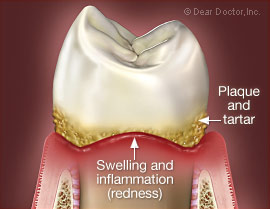
We’ve all heard of gum disease and gingivitis, but what is periodontal disease?
Periodontal disease is the term used to describe severe gum disease which has progressed through the early stages of gingivitis and is now more serious. If you imagine your gums hug your teeth, like a tight shirt collar, this is the action of healthy gums.
Gums exist to hug your tooth and protect the root of the tooth from bacteria, plaque, decay and exposure. Healthy gums are tight and snug against the tooth, so no germs can penetrate below. However, gingivitis causes the gum to become puffy, soft and inflamed. Once the gum is unhealthy and infected with gingivitis, it becomes looser and does not hug tightly around the tooth. 
The unhealthy gum relaxes, and is soft and spongy – allowing bacteria, plaque and tartar to penetrate the root of the tooth. As this inflammation worsens, the gum becomes looser and looser, exposing more of the tooth’s root and trapping in more bacteria and tartar. The process of the gum loosening and affecting the tooth’s root, is called periodontal disease.
As with most conditions, there are degrees of periodontal disease. Mild forms are treatable but severe periodontal disease can lead to loosing teeth. The first signs are bleeding, redness and puffiness of the gums.
Many patients see bleeding gums and think they should stop brushing or flossing the area to let it heal, however this is the exact opposite of what you should do. Pay more attention to any areas that are puffy, red or bleeding when brushing and flossing. Our Oral Health Therapist and dentists are very experienced with periodontal disease and can help you get your gums under control.

Periodontitis is the second most common dental disease after caries. For example, according to the American Academy of Periodontology, 65 million US adults over the age of 30 suffer from periodontitis.
I have noticed you don’t monetize vividdental.com.au,
don’t waste your traffic, you can earn additional bucks every month with new monetization method.
This is the best adsense alternative for any type of website (they approve all sites), for more details simply search
in gooogle: murgrabia’s tools